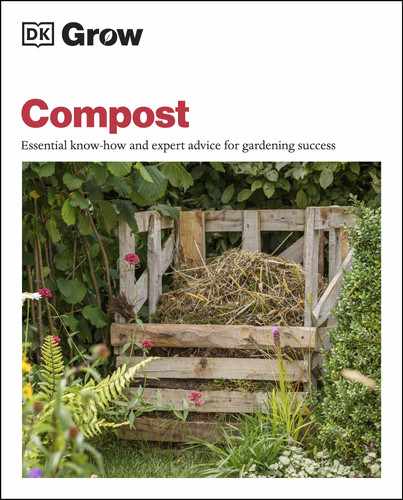USING COMPOST AS PLANT FOOD
Unlike manufactured fertilizers, which will deliver exact amounts of plant nutrients, the chemical components of homemade composts depend on the materials you include in the mix. However, despite this variability, compost plays an important role in feeding plants by improving the soil structure, which in turn increases the air, water, and nutrients available to roots and promotes healthy growth.

Soil enriched with homemade compost usually contains enough nutrients to feed root crops such as carrots.
PLANT NUTRIENTS EXPLAINED
To thrive, plants require three key nutrients—nitrogen (N), phosphorus (P), and potassium (K)—as well as trace nutrients, such as iron, manganese, zinc, copper, boron, and molybdenum, which are needed in smaller quantities. You may see the letters NPK on manufactured fertilizers and composts, with numbers next to them showing the ratio of nutrients that the products contain. For example, a balanced fertilizer will have an NPK of 5:5:5, which means it has equal proportions of all three nutrients.
KEY PLANT NUTRIENTS Most plants thrive in soil that delivers these three nutrients, but some require higher doses of one particular element. For example, leafy crops need plentiful supplies of nitrogen, while flowering plants require more potassium.


n Double-tap image to read the labels
Plants require nitrogen, phosphorus, and potassium to sustain healthy growth.
FOOD FOR THOUGHT
There is no precise way of measuring the exact nutrient content of homemade compost, unless you have it tested in a laboratory. This may be a problem if you want to give your tomatoes a fix of potash (potassium) or feed the lawn with a high dose of nitrogen. Unlike many artificial fertilizers, the compost from your bin will contain relatively low levels of plant nutrients, whatever waste materials you used to make it. However, the microbes and invertebrates it contains open up channels for air and water to pass through, which in turn makes nutrients more freely available because plant roots take up their food in a solution of water. By improving the soil in this way, compost usually delivers all the goodness garden plants need to thrive, although some crops may benefit from an additional fertilizer, such as seaweed concentrate.

Using compost as a mulch will help to provide plants with the nutrients they need for healthy growth.
Using Compost | USING COMPOST AS PLANT FOOD
NEED TO KNOW
- Plants take up nutrients in a solution of water, which is why free-draining sandy soils are often infertile, since the nutrients are washed out of them when it rains. Clay soils hold on to nutrients more effectively, but can become compacted and waterlogged, which drives out the air that roots need to thrive.
- When applied to poorly structured soils, the nutrients in artificial fertilizers can easily be lost and leach into and pollute the groundwater.
- Applying a compost mulch to improve soil structure alleviates both problems, but use a layer of no more than 2in (5cm) on ornamentals or 3in (7.5cm) on crops each year, since organic matter can also cause pollution if applied in large quantities.
SPOILED BY RICHES
The overuse of fertilizers, both in gardens and through agricultural practices, has serious consequences for the environment. Phosphates and nitrates that plants do not absorb filter down through the soil layers and pollute the groundwater, which then flows into rivers and oceans. These excessive nutrients cause algal blooms that use up the oxygen in the water, killing plants and wildlife.
Too much fertilizer can also directly harm your plants, causing “reverse osmosis,” which is when the soil water contains higher concentrations of nutrients than the roots’ cells, causing water and nutrients to flow out of the plant. While it is possible to overfeed with homemade composts, this is unlikely to occur if you apply a thin mulch once a year. Mulching in spring on free-draining soils also lowers the risk of nutrients leaching out over winter.
Compost has another advantage in that it releases its nutrients over time rather than in one dose. The finished compost that you use on the garden will continue to decompose after you have applied it, and may deliver low levels of some nutrients over the course of a few years, rather than weeks. The process of decomposition also speeds up when temperatures rise during the summer, just when plants are growing quickly and need more nutrients.
Remember, too, that woodlands sustain trees and plants without additional fertilizers and many fruit and vegetable crops will thrive on lower doses than the fertilizer manufacturers recommend. Recent research also suggests that crops fed less may be more nutritious, so think twice and check if your plants are really suffering before reaching for a packet of fertilizer.

Excessive use of artificial fertilizers leads to the pollution of waterways such as rivers and streams.
